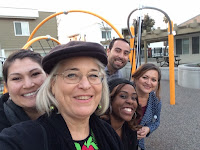 When we come back from FWCC gatherings, we are often asked, “What did
you do there?” During a worship session, Friends had a chance to respond
briefly to this question. Here’s
a sampling of responses from the FWCC gathering that took place at Stony Point, NY, in March 2017:
When we come back from FWCC gatherings, we are often asked, “What did
you do there?” During a worship session, Friends had a chance to respond
briefly to this question. Here’s
a sampling of responses from the FWCC gathering that took place at Stony Point, NY, in March 2017:- Tuve la oportunidad de participar por segunda vez en una actividad del mundo entero y en ambas recibió la alegria. De conocer nuevos hermonaos quienes forman parte de otras Juntas Anuales en todo el mundo, eso fortecio mi ministerio eso impulso mi compromiso y me hizo saber que peudo ser tan útil n mi Junta Anual y en otros lugares . [I had the opportunity to participate for a second time in an activity of the entire world and both times I felt happiness. To know new brothers and sisters who form part of other yearly meeting, fortifies my ministry, moves forward my commitment, and makes me realize how I can be useful in my Yearly Meeting and other places.]
- Esta reunion me ayudo en analizar cómo se encuentra mi salud espiritual, cómo esta mi relación con Dios. [This meeting helped me to analyze how my spiritual health is, and how my relationship with God is.]
- El comité me mostró que la guía del Espíritu Santo puede eschucharse en silencio y entirse en el Corazón. [This committee showed me that the guidance of the Holy Spirit can be heard in silence and enter into the heart.]
- FWCC made me do the work of engaging with my Yearly Meeting, which has transformed my life, giving me important work of peacemaking among Friends.
- My journey with FWCC was the finding of my Quaker “home”…. Experiencing the diversity of Friends and [hearing] personal stories/testimonies, sharing the excitement of World Quaker Day, the smiles of friendship, giving and receiving…..
- For me it’s not about the work, it’s about love—that’s where the transformation happens.
- Working with Blythe on the budget subcommittee, I made a new friend and I learned more about how to modulate my intensity so as to be more welcoming and less putting others on the defensive.
- The messages during worship on both days [offered] the vision of peace….as well as how to break away from systems of oppression….
- Meeting and communicating with people from diverse cultures and languages….[to to] see about a two-way exchange with Cuba, ask about future pilgrimage plans, connect with others about international peace/justice/FWCC activities….
- Home groups are always powerful….
- Spending time with Friends across the branches has helped me feel more complete. Quakerism is a spectrum and no one branches has all the answers or connections with God….We need to come together to find and experience them.
- FWCC has given me a place to be myself within the wider family of Friends, a perspective on Quakerism beyond the limits of my own meeting and tradition.
- What I am called to do: raise awareness of the riches to which I am exposed so that others may come to know them, make connections, use my translation and interpretation abilities in the service of communicating things that can deepen our communities.
- I led a workshop in which Friends taught each other and I had the joy of seeing their transformation. I also formed relationships that have transformed my life for the better.
- I did work on eco-justice/climate change, caring for the earth and its inhabitants. The Kabarak call is a powerful statement of this work, which I have used on several occasions as an example of a Quaker statement on climate change.
- The FWCC section meetings have become my new “home church,” and I want to spread the word among Friends I see regularly and those I have yet to meet. It’s been very spiritually nourishing and has inspired me to try to inspire my home meeting and neighboring meetings to come join the work and fellowship of FWCC.
- Sharing ideas and music, encouragement in developing areas of particular ministry, meeting Friends across Quaker boundaries.
- Godly play, morning circle in meditation room, Thursday worship in Spanish, eating and worshipping together.
- Holding the presence of Spirit in a group—eldering.
- In Pisac I became an elder for a group of young adults. After a long afternoon of spiritual accompaniment, I looked around for an elder so I could debrief. Then I realized the elder was me.
To learn more about FWCC, check out: Friends World Committee for Consultation















